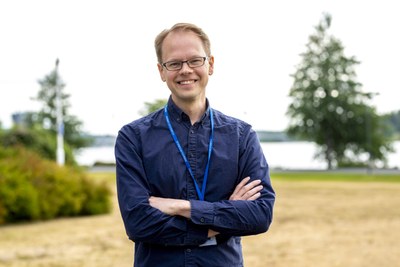Researcher of the Month: Jarmo Hämäläinen
Jarmo Hämäläinen, Professor, Vice Dean
Hey Jarmo! Who are you and what do you do at JYU?
I am Jarmo Hämäläinen, a professor of cognitive neuroscience at the Department of Psychology, JYU. Currently a lot of my time goes to different meetings and development of research capabilities, infrastructure and support at our Faculty of Education and Psychology in my role as the vice-Dean responsible of research. I do have time also for research and am involved in studies carried out, for example, in the Centre of Excellence in Learning dynamics and intervention research.
What is your current research interest?
Brain development, learning difficulties and learning processes have been my core research themes. Most recently I have been interested in tapping into brain processes during learning tasks. This could shed some light on individual differences in learning outcomes and in explaining why some individuals learn faster than others.
What do you think would be interesting to research in the future?
There are two areas that have piqued my curiosity more or less recently. More recent one is related to aging and learning difficulties. We know very little of how learning difficulties continue to affect individuals in older age, how possible cognitive decline interacts with learning difficulties and how these should be taken into account when designing services to older individuals. The less recent one is related to development in early age: we know quite a bit of what kind of changes occur in brain activity in early years, but what do these changes mean for cognitive development; are they concurrent epiphenomena, predictive of cognitive development (and necessary for our cognitive abilities to reach certain level), which of these changes might be actually caused by cognitive development (instead of the otherway round), and could the brain-level changes inform us in more detail on how we are able to develop our remarkable cognitive skills as adults.
Some of Jarmo's recent published studies:
- Hsu, Y.-F., Tu, C.-A., Bekinschtein, T. A., & Hämäläinen, J. A. (2023). Longitudinal evidence for attenuated local-global deviance detection as a precursor of working memory decline. eNeuro, 10(8).
- Virtala, P., Kujala, T., Partanen, E., Hämäläinen, J. A., & Winkler, I. (2023). Neural phoneme discrimination in variable speech in newborns : Associations with dyslexia risk and later language skills. Brain and Cognition, 168, Article 105974.
- Hsu, Y.-F., Waszak, F., Strömmer, J., & Hämäläinen, J. A. (2021). Human Brain Ages With Hierarchy-Selective Attenuation of Prediction Errors. Cerebral Cortex, 31(4), 2156-2168.
- Xu, W., Kolozsvari, O. B., Oostenveld, R., & Hämäläinen, J. A. (2020). Rapid changes in brain activity during learning of grapheme-phoneme associations in adults. NeuroImage, 220, Article 117058.
More of Jarmo's publications can be found in Converis
View previously introduced researchers of the month from here: https://cibr.jyu.fi/en/cibr-collegium/researcher-of-the-month
